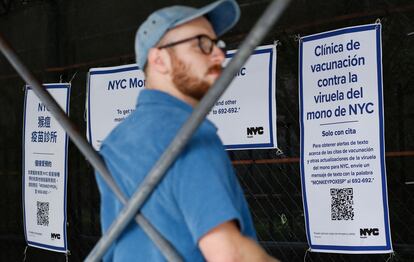Monkeypox is officially a global health emergency
WHO’s director general Tedros Adhanom Ghebreyesus made the decision despite a divergence within the committee of experts that has evaluated the outbreak

The World Health Organization (WHO) has declared the current outbreak of monkeypox a “public health emergency of international concern.” This is the second time in two and a half years that the agency has been forced to make this decision in the face of the spread of a disease, after having done so in early 2020 with Covid-19.
The current outbreak has already caused more than 16,500 cases in 75 countries, most of them mild or very mild, since the first infections were identified in London in early May. Two weeks later, the virus was also detected in Lisbon and Madrid; this marked the beginning of a sustained increase that has not ceased. So far, according to the WHO, there have been five deaths in West Africa.
More than 95% of cases have been diagnosed in men who have intercourse with other men in environments where close contact with strangers, or several partners in a short time, is frequent. This new form of transmission of the virus – which has been known for decades, but had never been spread on a large scale – is one of the WHO’s greatest concerns.
“We have an outbreak that has spread around the world rapidly through new modes of transmission, about which we understand too little, and which meets the criteria” to be declared a public health emergency, stated the WHO director general, Tedros Adhanom Ghebreyesus, at a telematic press conference held in Geneva.
Spain, with more than 3,500 confirmed cases, is the most affected country in the world, although the rapid growth in cases presented in the United States – which has already reported almost 3,000 infections, and has doubled the number of cases in a week – makes it foreseeable that it could soon become the epicenter of the international outbreak.
Tedros Adhanom Ghebreyesus made the decision by the powers bestowed by his position, despite the fact that the experts of the committee that met last Thursday were divided, just as they were a month ago in the first meeting that was held to assess the outbreak. In four weeks, the number of global cases has quadrupled and the affected countries are almost double.
The health emergency declared this Saturday represents the highest level of alert considered by the International Health Regulations, a distinction that, until now, only Covid-19 and polio shared. The measure confers powers to the WHO in the international arena through recommendations that will be mandatory for member countries.
Before this outbreak – the largest in history – the virus usually reached man through activities such as hunting or through close contact with animal carcasses. When a person became infected, however, the pathogen had not proven to be particularly contagious, and outbreaks were small and self-limited.
In order for contagion to occur, two people must be in close contact, mainly with pustules on the skin, although it can also happen through thick drops of saliva. As studies published since the beginning of the outbreak have also detected the virus in semen and rectal mucosa, the hypothesis that monkeypox can be transmitted sexually has been gaining resonance among most experts, although it needs to be confirmed by research.
Although the vast majority of diagnosed cases have been mild or very mild, between 4% and 9% of patients — depending on the country — have required hospitalization due to the intense pain and discomfort caused by the rash in some parts of the body, such as the genitals and the perianal area. The most serious complications that have occurred outside Africa are some cases of encephalitis and pneumonia.
The rapid circulation of the virus – as well as the fact that it reached vulnerable groups, such as children, pregnant women and immunosuppressed people, particularly in countries with poor health indicators and weak health systems – was one of the points that the WHO experts had cited at their first meeting as a possible reason to change the position of the organization.
As director general, Tedros Adhanom Ghebreyesus issued a series of recommendations that will now guide the international response to the virus. Most are aimed at improving case detection and the adoption of public health measures such as contact tracing, to slow the rate of infection.
The WHO is also calling for the assessment of the use of vaccines, both for people who have already been exposed to the virus through contact with a positive case and for those who could be, such as health personnel whose work puts them in direct contact with infected patients, or those who take part in the risk practices that in the last few weeks have proven to be the main route of transmission.
An important highlight of the document is that it mentions, for the first time, the use of “second generation vaccines” which, until now, had not been resorted to due to their higher risk of side effects. The only one available on the market is Imvanex (Jynneos in the United States), manufactured by the Danish pharmaceutical company Bavarian Nordic, although its production capacity is still small, and dose availability is scarce.
The WHO statement also urges countries that have the capacity to produce vaccines, antivirals and diagnostics to promote measures to increase production, and make sure they are available to the countries that need them most, based on public health needs and solidarity, and at a reasonable price.
Tu suscripción se está usando en otro dispositivo
¿Quieres añadir otro usuario a tu suscripción?
Si continúas leyendo en este dispositivo, no se podrá leer en el otro.
FlechaTu suscripción se está usando en otro dispositivo y solo puedes acceder a EL PAÍS desde un dispositivo a la vez.
Si quieres compartir tu cuenta, cambia tu suscripción a la modalidad Premium, así podrás añadir otro usuario. Cada uno accederá con su propia cuenta de email, lo que os permitirá personalizar vuestra experiencia en EL PAÍS.
¿Tienes una suscripción de empresa? Accede aquí para contratar más cuentas.
En el caso de no saber quién está usando tu cuenta, te recomendamos cambiar tu contraseña aquí.
Si decides continuar compartiendo tu cuenta, este mensaje se mostrará en tu dispositivo y en el de la otra persona que está usando tu cuenta de forma indefinida, afectando a tu experiencia de lectura. Puedes consultar aquí los términos y condiciones de la suscripción digital.









































